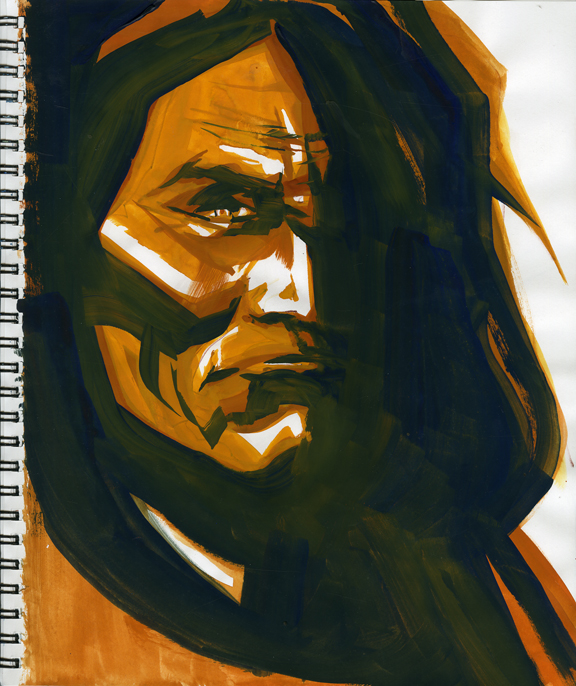One of my least favorite comic strips as a youth was one called "The White Indian." It just seemed lame to me and kind of far-fetched. Well, just when you think you've heard it all. . .
The White Apache
His Apache name was Dji-li-kine, or Pine Pitch House, and he was not only a chief but he was Geronimo's father-in-law. He was a white captive, similar to Mickey Free, who chose to stay with the Apaches. John Rope said he was "not as tall as an old-fashioned musket," but he was "about the best fighter of any of them. . .the Chiricahua chiefs were like nothing to him and they usually did what he advised."
Daily Whip Out:
"Dji-li-kine The White Apache"
"Dji-li-kine The White Apache"
When Crook first tracked down Geronimo high in the Sierra Madres in May of 1883, the old chief was intent on hatching a devious plan. The Chiricahuas would feign friendship with the soldiers and the scouts, but Geronimo and Kayatennae and a couple other chiefs planned to invite the White Mountain Apache scouts to a dance where Chiricahua warriors would circle behind the scouts and slit their throats. When they took this plane to Dji-li-kine he dismissed it out of hand: "I won't join in this because the White Mountain people are like relatives of mine." Geronimo told him they were going ahead with the plan with or without him, to which the White Apache said, "You chiefs don't mean anything to me. I have been with you many times and helped you kill lots of Mexicans and Whites and that's the way you got the clothes you are wearing now. I am the one who has killed these people for you and you have just followed behind me. I don't want to hear you talking this way with me again."
Geronimo did proceed with the plan but it fell apart when Chief of Scouts Al Sieber wisely advised the White Mountain Apache scouts not to attend the dance.
A colorized version of the famous C.S. Fly photograph of the Geronimo-Crook parlay at Embudos in March of 1886. That is Crook, seated, second from right and that is Captain John G. Bourke next to him, on Crook's right, looking at the camera. It is Bourke who wrote down the entire exchange from memory and preserved the encounter for historians. Bourke spoke fluent Spanish and studied Apache intently. He amassed an Apache dictionary which he planned on printing, but it never got on the press.
The scouts called Bourke "Nantan Justa Chuli" (Captain Cactus).
Daily Whip Out:
"Lieutenant Charles B. Gatewood"
"Men, our people whom we left at our base camp are now in the hands of U.S. troops! What shall we do?"
—Geronimo, May 15, 1883, having a premonition that Crook's troops had in fact captured Bonito's camp 120 miles away
There are no photos of Cochise, but here is a first-person account of someone who met him, and, who described him as a handsome man of
about "fifty winters, straight as a rush, six feet in stature, deep chested, roman nosed, black eyes, firm mouth, and kindly and even somewhat melancholy expression tempering the determined look of his countenance. He seemed much more neat than the other wild Indians I have seen and his manners were very gentle."
—Captain John G. Bourke, describing Cochise, who he met on February 3 of 1873
It was also Captain Bourke who fought for the Apaches all during their imprisonment in Florida and Alabama. He visited the Apaches at Mount Vernon Barracks in Alabama and addressed them like this:
"I have known you people for just twenty years. I knew you first when Loco was living outside Fort Craig, New Mexico, and again when you were all on the war-path in the Huachuca Mountains, and down in Mexico. I used to think that you never would come off the war-path. I went to see you in the Dragoon Mountains when Cochise was still alive, and some of you were just young boys. Then I went with General Crook into the Sierra Madre, and after he got hold of you and set you to work for your living near Camp Apache, you began to do ever so much better and some of you never forgot what he told you."
—John G. Bourke




No comments:
Post a Comment
Post your comments